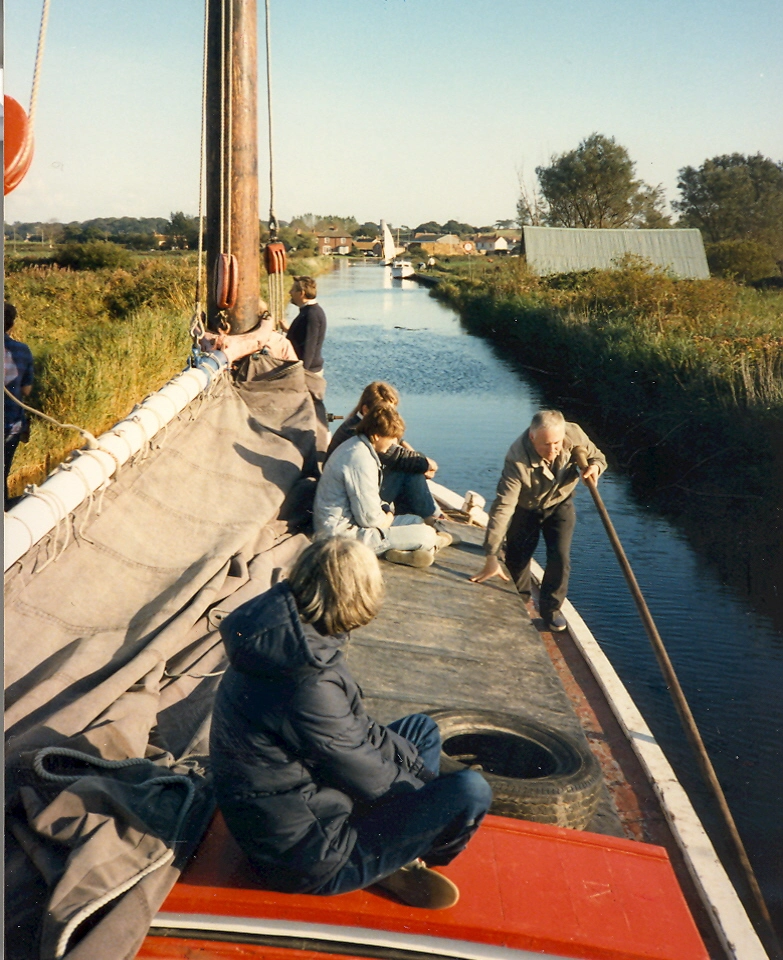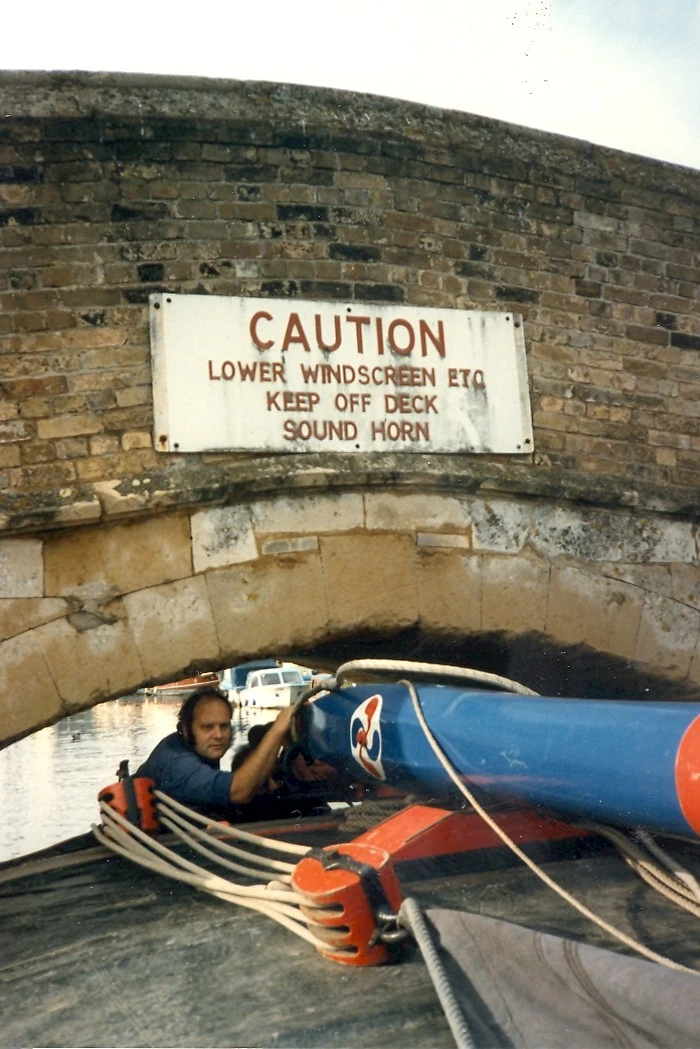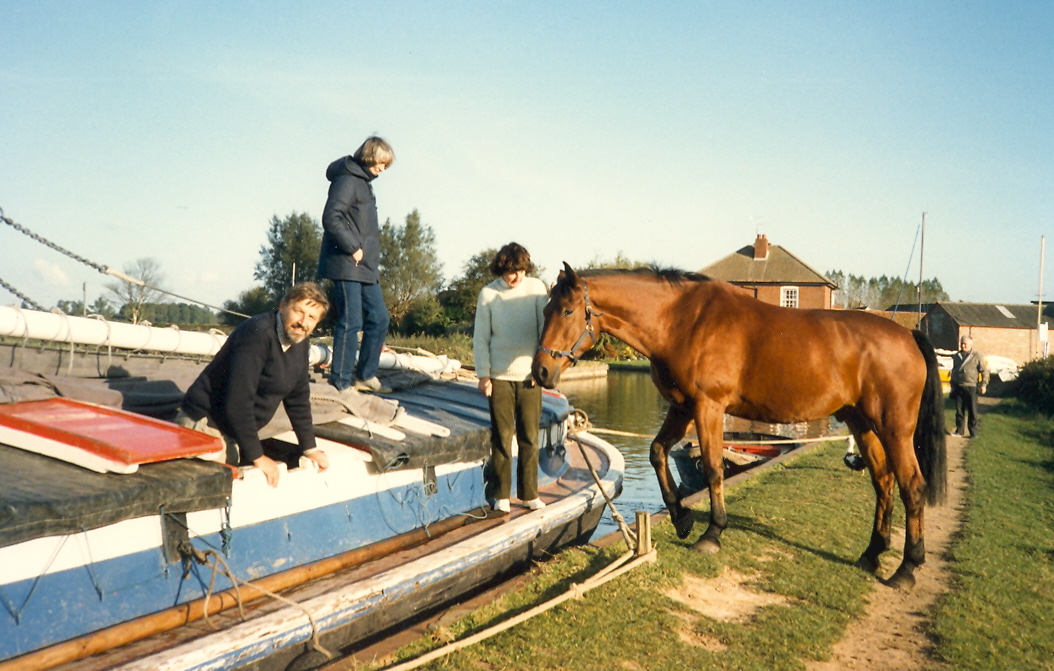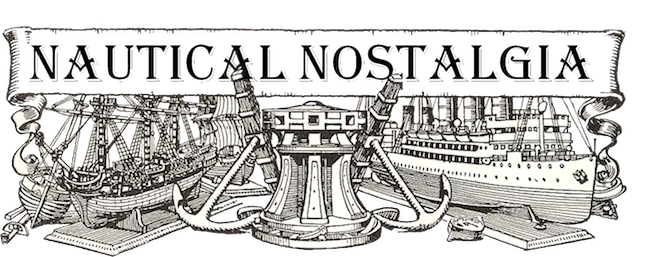First published in the NWT Journal, Autumn 1986
Author: Admiral Elsan (David Bray)

I would like to take space in these pages to highlight the work of our skippers. At our committee meetings we often spend the whole evening discussing matters several times removed from the practicalities of sailing ALBION. At the AGM a vote of thanks usually goes to Trustees, Secretary, Chairman, Treasurer and Committee for all the work done in the course of the year, but very rarely does anybody remember the continuous not inconsiderable effort put in by our skippers.
I must admit to a certain amount of personal trumpet- blowing here, since, in addition to serving on committee and editing this here rag, I also frequently sail as skipper in ALBION and have been doing so for many years. Perhaps it is not generally realised that ALBION is chartered out almost every weekend, March to October, plus a few full weeks and odd day and evening trips.
Whenever she sails the Trust must provide a competent skipper. There is no room for incompetence here; ALBION in unskilled hands can prove a lethal tool, she can do endless damage to herself and other craft. All our skippers are volunteers. They all offer their services (almost) free of charge – our skippers fees just about cover out-of-pocket expenses. Unknown quantities are the charter party, the state of ALBION, and the weather.
Circumstances can result in a weekend charter being anything from a holiday to a nightmare. The skipper often has to exercise diplomacy with the charterers.
Some charterers return year after year and acquire wherrying skills such that they may be of great value to the skipper. It must be added that the skipper is quite reliant upon the charter party to assist him in getting ALBION along. Frequently a party has the same skipper several years running, and a good team relationship can form. At the other end of the spectrum is the party who have not been before and to whom a weekend in ALBION is not suited. A weekend aboard ALBION is of necessity a rough and ready affair. It can be dirty, wet and uncomfortable, especially if the weather is foul. I have had an (unsuspecting) party turn up in evening dress, bow ties, and the ladies in long dresses. It rained the whole weekend. A good time was had by nobody and was my name mud!
Another type of charter party is those who don’t want to be there. Occasionally we have a school or Youth Training charter, and often the youngsters resent being sent on such a spree. Under these circumstances the skipper needs to display a great deal of tact and patience. I must emphasise that this is not the case with all such charters – the majority work very well. A third type are those that sit down below playing cards or some such – all of them – all the time. The skipper is essentially single- handed. But as I say, the majority of our charterers are keen wherry enthusiasts, happy to help with the work and learn the skills required. We are eternally glad of their support and I give them all due praise.

Another imponderable is the state of ALBION. A weekend charter starts at about 7pm Friday, and the Skipper has often travelled straight to Womack from work. It can be disconcerting to find her not ready to go, especially if it is late in the season and thus after dark. Empty gas cylinders, empty water tanks, missing gear, blocked up toilet. All can provide headaches for the Skipper. Even worse – charter party and Skipper present – ALBION absent! Frantic phone calls. Also remember that in my day there were no mobile phones, and the nearest public phone to the Womack base was in Ludham village, nearly a mile away.
Nowadays we have things reasonably well organized. We have storage sheds at Womack, and a fair complement of spare gear. Water and electricity are laid on at the dyke. I remember once having to fill the water tanks when ALBION lay at Horning Vicarage. It was done by bucket from the kitchen at the vicarage 300 yards from the berth. After about a dozen trips with buckets I was getting a trifle fed up with it all! The weather and environment often provide the skipper with immense problems. The wherry evolved to carry out a specific function on the 19th century Broads. We have different requirements. The Broads today are a very different place. ALBION is required to sail during charter periods, and to end up back at Womack on schedule. Running to a timetable is not her strong point. She has no engine and best use must be made of the tides.
The weather is not made to measure. Severe conditions can mean that ALBION does not move for the whole weekend. Even worse on a weekend is where she has been sailed to, say, Horsey Mere on the Saturday and then it blows SW force 9 or 10 on Sunday precluding a return. The charter party have left their vehicles at Womack. A holocaust of transport ensues, and ALBION gets left at a “foreign port” until the next charter when similar problems associated with a one-way trip arise.
Further problems arise for the Skipper due to the Broads environment. We are continually surrounded by hire boats of ever-increasing size and value. Standards of competence displayed by their hirers are deteriorating. In the eyes of the hire boat owner, these people can do no wrong. If there is a collision between a hire cruiser and ALBION we are instantly and invariably to blame. We are frequently told we are on the wrong side of the river (“keep to the right”). Equally frequently we are told that ALBION shouldn’t be on the nver at all “she is much too big”. I would like to state the other side of the argument. Not Iong ago we came across a hire cruiser agound in the riverbank. The bottom was all stones and wooden piles. She had been there three days.

Nobody had offered to help them. The elderly people on holiday on board had never been on a boat before. We, (on a Wherry Trust members cruise) rescued them. No heroics, just a careful check for damage, then a steady pull on a rope with half-a-dozen hefty wherry nuts, and they were away. In return they gave us a tow a short distance against the tide, saving us about two hours heavy quanting. In the last twelve months I have helped four hire boats in difficulties.
The skipper has to contend with all sorts of major and minor emergencies. Somebody falls overboard while ALBION is under full sail in a breeze and cannot be stopped. ALBION arrives at the Ferry House pub, and there’s nowhere to moor. Just two of the many problems to be solved.
About two years aqo the committee asked me to produce a set of notes – a “skippers’ manual” on all aspects of sailing and handling ALBION. I did so, incorporating much I’d Iearned the hard way during twenty-five years of sailing in her. A few copies were produced and dished out to skippers and mates. I don’t think they paid much attention to it – it was greeted with mild amusement. It seems to have died a natural death. Nevertheless, I would like to pay a tribute to our skippers. Without them the trust would not be able to function. They all put in a lot of hard work and endure discomfort – especially when the deckhead over the Skippers bunk leaks on a rainy night!
